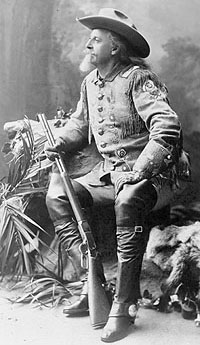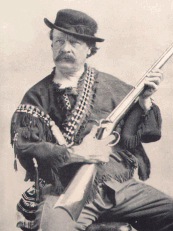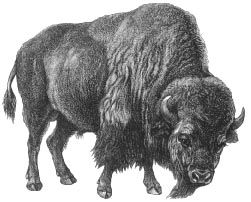
|
|
Buffalo
Bill
and the
Kalamazoo Connection
by Larry L. Coin
 Mere
mention of the name Buffalo Bill conjures up images of a more dashing,
adventurous and maybe not so glorious a time. Images of the Wild West
when this country was being settled and the migration of the white man
to the west were pushing the Native American Indian out of his homelands.
Images of times when game was abundant and herds of buffalo roamed all
across the plains.
Mere
mention of the name Buffalo Bill conjures up images of a more dashing,
adventurous and maybe not so glorious a time. Images of the Wild West
when this country was being settled and the migration of the white man
to the west were pushing the Native American Indian out of his homelands.
Images of times when game was abundant and herds of buffalo roamed all
across the plains.
William Frederick Cody, or "Buffalo Bill" as he is better known in the history books, was a true living legend. Cody's name may be synonymous with the west, but he has close ties with Kalamazoo, Michigan.
Cody was born in Iowa in 1846 and went on from there to live a life that was in many ways more exciting than fiction. He was a pony express rider as a teenager, served as an Indian scout for the army, stole a horse or two in his day and gained fame as a buffalo hunter for the construction crews of the Union Pacific Railroad.
 Cody
was first immortalized in print in 1873 by
Ned Buntline, who dramatized Cody's life in one of his dime novels.
From that point on, Cody's reputation grew faster than his exploits
and was probably a whole lot more exciting, too.
Cody
was first immortalized in print in 1873 by
Ned Buntline, who dramatized Cody's life in one of his dime novels.
From that point on, Cody's reputation grew faster than his exploits
and was probably a whole lot more exciting, too.
In point of fact, Cody may not have been
the first, and he certainly wasn't the only man to have the name "Buffalo
Bill" bestowed on him. Another frontiersmen sporting that title
was William
Averill Comstock, who was born in 1842 in Comstock, Michigan, a
town that was named for his father, Horace
Hawkins Comstock. The elder Comstock was a prominent citizen and
the first senator to be elected from Kalamazoo County in 1835. His first
wife was Sarah Sabina Cooper. She was from Cooperstown, New York and
was a niece of the novelist James Fenimore Cooper. Sarah Cooper Comstock,
for whom Cooper Township in Kalamazoo County was named, died in 1846
when her son William was just 4 years old.
Mr. Comstock then moved to Otsego, Michigan where he remarried. This
second wife lived only one year. He moved back to Cooperstown where
he married a third time. His third wife died during their visit to Ossining,
New York. Comstock moved to Ossining, were he married a fourth and final
time. He died in Ossining, New York on March 15, 1861 at the age of
54, leaving four children, three girls and a boy.
Young William lived with his father, but eventually ended up in Wisconsin
under the care of his older sister Sarah, who had married Judge Eleazer
Wakeley,
May 8 1854.
 William
Comstock had little formal education, but was inspired by the works
of his great uncle James Fenimore Cooper. He, too, headed west at an
early age and by the time he was 21 had earned a great reputation as
a hunter and guide. He had also served as a pony express rider.
William
Comstock had little formal education, but was inspired by the works
of his great uncle James Fenimore Cooper. He, too, headed west at an
early age and by the time he was 21 had earned a great reputation as
a hunter and guide. He had also served as a pony express rider.
At the age of 26, Comstock, because of his great knowledge of Indian languages, was chief of scouts and interpreter at Fort Wallace, Kansas. He was the favorite scout of General Phil Sheridan and General Armstrong Cuter. He was nationally known as the "Ace of Scouts." Because of his prowess with a rifle he also had earned the title of "Buffalo Bill."
Even though he was considered to be a man of few words with an even disposition, Comstock was not immune to gun play. In one instance, after entering into an agreement with a contractor to show him the location of timber that could be cut, the contractor failed to pay Comstock and boasted that he was a member of Quantrell's Guerillas.
Tired of the man's stalling, Comstock set up a showdown at the post trader's store and confronted the contractor on the porch of the store. According to Charles E. Chase, an old Indian fighter who claimed to be an eye witness, "Comstock got Weightman in the store and both started to draw at the same time. Comstock fired four shots before Weightman ever pulled the trigger. When they turned Weightman over, every one of Comstock's shots had hit him in the heart and the four holes could have been covered with a silver dollar."
Comstock was arrested and turned over for trial. When arraigned before the court and asked by Judge M. S. Joyce how he would plead, Comstock said, "Guilty, sir."
The Judge asked him if he didn't wish to change his plea and Comstock replied, "No, sir." "The judge immediately exclaimed, "Ye are a damned fool for tellin' it. I discharge ye for want of evidence."
Later there arose a dispute over the title "Buffalo Bill," which the army officers of Fort Wallace had bestowed on Comstock and which the workers on the Kansas Pacific Railroad had given Cody. There are other Buffalo Bills, too, but only these two settled the issue.
How
the sobriquet of "Buffalo Bill" was won.
A hunt was arranged between the two, supposedly near Monument, Kansas.
The prize was $500 and the title "Buffalo Bill." Cody apparently
won the contest, killing 69 bison to Comstock's 46. Of such things,
legends are made.
Chase, who knew both Cody and Comstock quite well, also had comments about the contest. "Bill Comstock could take Bill Cody out at night and lose him," Chase said in published comments. "Cody was a good man, but Comstock - and I am not alone in this - was a better man."
Cody went on to organize Buffalo Bill's Wild West Show and take it on tour all over this country and Europe. The show, which included upwards of 800 performers and close to 600 horses, made a number of visits to Kalamazoo between 1893 and 1914 when Cody retired.
Comstock's story ended a few months after
the contest with Cody. He was reportedly ambushed and killed by Indians,
but others believe he was killed by another scout known as "Sharp"
Grover, who survived the ambush and shortly after the incident took
over Comstock's ranch.
Bill Comstock's body lies in an unmarked grave, so far as we know, in
the old Fort Wallace Post Cemetery in the State of Kansas. He met his
death on August 27, 1868, in his twenty-sixth year. For the winning
of the west, in such a short span of time, few men did more.
|
FUTURE SHOW DATES
|
||||
|
March 15-16,
2008
|
• |
March 21-22,
2009
|
||
Copyright © 2007 Yankee Doodle Muzzle Loaders, Inc. All rights reserved.
This website may not be reproduced, in part or in whole, without the written permission
of Yankee Doodle Muzzle Loaders, Inc.
This web page is designed to be viewed best at 800 x 600 true color.
|

|
||
|
|
Weather
|
|
|